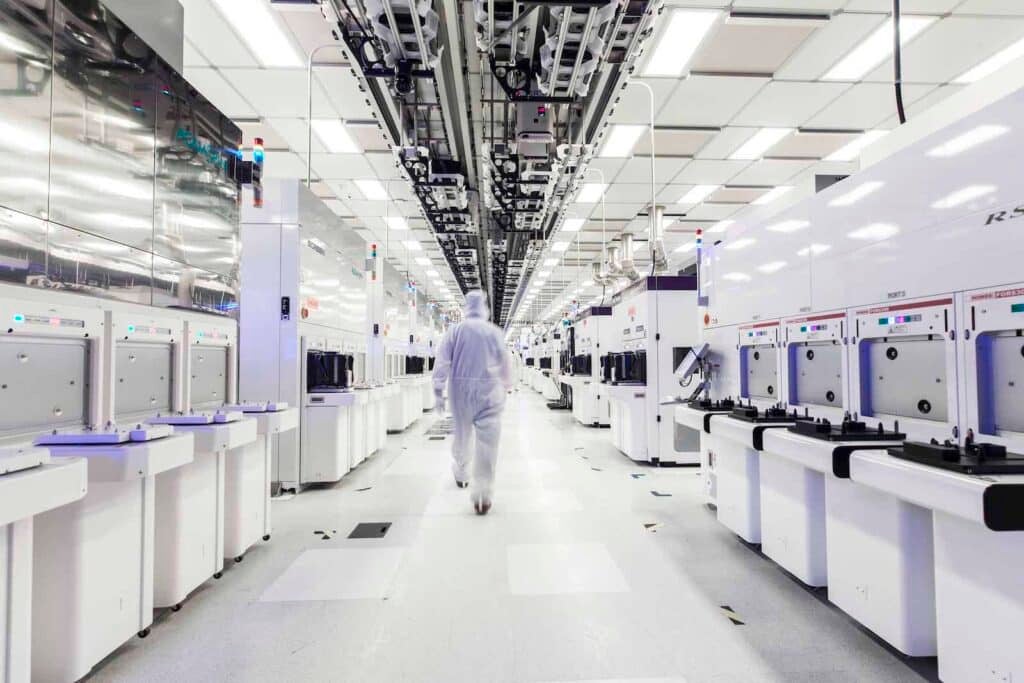General Motors and GlobalFoundries announced a strategic, long-term agreement establishing dedicated chip-making capacity exclusively for GM brands.

Under this agreement, GlobalFoundries will manufacture chips for GM at an advanced semiconductor facility in upstate New York, bringing a business-critical supply chain into the continental U.S.
GlobalFoundries has offices across the U.S., Europe and Asia. The company’s trusted foundry is located in Essex Junction, NY, along with a manufacturing center. The company has design centers in Santa Clara, California and Austin, Texas.
“GlobalFoundries will expand its production capabilities exclusively for GM’s supply chain,” said Thomas Caulfield, president and CEO of GF, “enabling us to strengthen our partnership with the automotive industry and New York State, while further accelerating automotive innovation with U.S.-based manufacturing for a more resilient supply chain.”

This new agreement supports GM’s strategy to reduce the number of unique chips needed to power increasingly complex and tech-laden vehicles. With this strategy, chips can be produced in higher volumes and are expected to offer better quality and predictability.
“We see our semiconductor requirements more than doubling over the next several years as vehicles become technology platforms,” said Doug Parks, GM executive vice president of Global Product Development, Purchasing and Supply Chain.
“The supply agreement with GlobalFoundries will help establish a strong, resilient supply of critical technology in the U.S. that will help GM meet this demand, while delivering new technology and features to our customers.”
Beating the chip shortage

A global shortage of semiconductor chips has hobbled the automotive industry for the last couple of years. The chip shortage originated with the COVID pandemic as businesses were idled to prevent the spread of the virus. At the same time, there was increased demand for consumer electronics.
To make matters worse, automakers idled production and canceled their semiconductor orders at the outset of the pandemic, and then were surprised with the speed at which the economy rebounded. Companies then had to compete for new semiconductor orders, and production has yet to catch up to demand. Some estimates put the damage to the industry at large at up to $210 billion.
In mid-2022, the U.S. government took steps to ameliorate the shortage in the longer term by passing the CHIPS Act, which provides more than $50 billion to support the domestic semiconductor industry. The act provides $39 billion to fund, build, expand or modernize domestic facilities and equipment for semiconductor fabrication; $12.5 billion for research and development to promote American leadership in advanced semiconductors and 5G communication; $2.7 billion for boosting supply chains and the semiconductor work force and a 25% investment in semiconductor manufacturing.
- SEO Powered Content & PR Distribution. Get Amplified Today.
- Platoblockchain. Web3 Metaverse Intelligence. Knowledge Amplified. Access Here.
- Source: https://www.thedetroitbureau.com/2023/02/gm-announces-chip-supply-agreement/
- 5G
- 7
- a
- accelerating
- across
- Act
- advanced
- Agreement
- American
- and
- announced
- Announces
- asia
- austin
- automakers
- automotive
- automotive industry
- become
- Better
- Billion
- boosting
- brands
- Bringing
- build
- businesses
- california
- canceled
- capabilities
- Capacity
- Catch
- Center
- Centers
- ceo
- chain
- chains
- chip
- chip shortage
- Chips
- Clara
- Communication
- Companies
- company
- Company’s
- compete
- complex
- consumer
- Consumer electronics
- continental
- Couple
- Covid
- critical
- Customers
- deal
- dedicated
- delivering
- Demand
- Design
- Development
- Domestic
- double
- doubling
- economy
- Electronics
- equipment
- establish
- establishing
- estimates
- Europe
- exclusively
- executive
- Expand
- expected
- facilities
- Facility
- Features
- Force
- Foundry
- fund
- further
- Global
- GM
- Government
- head
- help
- higher
- HTTPS
- in
- increased
- increasingly
- industry
- Innovation
- investment
- large
- Last
- Leadership
- located
- long-term
- longer
- make
- Malta
- manufacturing
- Matters
- max-width
- Meet
- modernize
- more
- Motors
- Need
- needed
- New
- New York
- New York state
- next
- number
- NY
- offer
- offices
- orders
- originated
- pandemic
- parks
- Partnership
- Platforms
- plato
- Plato Data Intelligence
- PlatoData
- power
- president
- prevent
- Produced
- Product
- product development
- Production
- promote
- provides
- purchasing
- put
- quality
- reduce
- Requirements
- research
- research and development
- resilient
- Said
- same
- Santa
- secure
- semiconductor
- Semiconductors
- several
- shortage
- some
- speed
- spread
- State
- steady
- Steps
- Strategic
- Strategy
- stream
- Strengthen
- strong
- supply
- supply chain
- Supply chains
- support
- Supports
- surprised
- Technology
- texas
- The
- their
- time
- to
- trusted
- u.s.
- U.S. government
- unique
- us
- Vehicles
- Vice President
- virus
- volumes
- which
- while
- will
- Work
- WORK FORCE
- years
- zephyrnet












